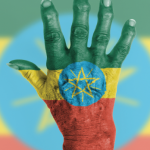Dr. Alakija also had a strong message for younger ACR members, urging them not to wait for others’ leadership if they see an inequality at their institution or elsewhere that should be addressed. “It is only by each one in our corners speaking out that we will build this critical mass. That is how we are going to build these bridges, that is how we are going to foster dialogue and that is how we are going to achieve health equity.”
‘As a global health community, we have to find a way forward for health equity—not just in this [COVID-19] crisis, but also going forward. … This is a call to action & a challenge for you to see what you can do.’ —Dr. Alakija
Unmet Needs in Rheumatology
At sessions throughout the day, many of the presenters returned to some of the key themes of access to healthcare, health equity and collaboration introduced by Dr. Alakija.
Worldwide, access to rheumatologic care and treatment poses a huge challenge, especially in lower income countries, where the unmet needs are greatest. Globally, millions suffer from rheumatologic and musculoskeletal health conditions, and the majority live in the most populous countries of Asia, Africa and South America.2 But disparities also exist in mid- to higher income countries, particularly in rural areas, where people may lack access to adequate diagnosis and treatment.
The workforce deficits needed to fully address pediatric rheumatology are particularly acute. Data from 2011 indicated the total international pediatric rheumatology workforce is at 12% of demand, with the U.S. possessing 40% of the total group.3 Up to 7 million children suffer from rheumatic disease around the globe, with 78% living in Africa or Asia.3
Global Burden of Disease
Public health professionals and policy makers don’t always understand the true burden of disease from rheumatic conditions, and often don’t make them a public health priority.
As part of the Global Researcher Spotlight session, Christopher Murray, MD, DPhil, chair of health metrics science and director of the Institute for Health Metrics and Evaluation at the University of Washington, Seattle, highlighted an important aspect of this. In his presentation, he shared insights from the Global Burden of Disease Study, an effort to systematically quantify the magnitude of health loss around the world.4
We’ve made significant progress over the past few decades reducing disparities in terms of childhood mortality, maternal mortality and deaths from infectious diseases, such as tuberculosis, AIDS and malaria, noted Dr. Murray. This reflects the priorities in the United Nations’ millennium development agenda, set out to help address the needs of the world’s poor. However, less progress has been made in terms of non-communicable diseases.4



